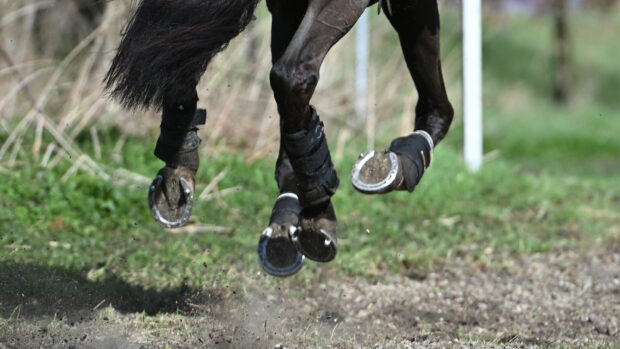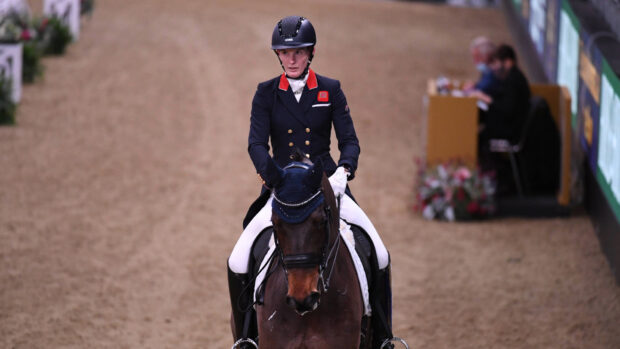The rider of a horse who tested positive for a banned substance that occurs naturally in some countries’ grass has been found not to be at fault, but her World Cup qualifier win remains disqualified.
South African showjumper Lisa Williams’ horse Campbell returned a positive urine sample for synephrine following their win on 29 August 2019 at the CSI*-W in Polokwane, South Africa.
Synephrine, a stimulant that is found in grass in countries including South Africa, is classed as a banned and specified substance by the FEI. Specified substances “should not in any way be considered less important or less dangerous than other prohibited substances” but they are those that are more likely to have been ingested by horses “for a purpose other than the enhancement of sport performance, for example, through a contaminated food substance”.
On 30 September 2019 Lisa Williams was notified by the FEI of the anti-doping rule breach and was not provisionally suspended, as synephrine is a specified substance. Campbell was provisionally suspended for two months.
At a preliminary tribunal hearing in 2019, Ms Williams said because of Campbell’s history of tying up and laminitis, she fed ad hoc low-sugar hay, and that, as she had since found out, the only hay available in South Africa contained synephrine. Ms Williams provided evidence such as laboratory certificates for grass samples, including from the “FEI secure grazing area”, from the Revil Stables showground where the event was held, that confirmed synephrine was present. She also provided a letter and her invoice from Midfeeds, South Africa’s largest feed supplier, confirming the presence of synephrine in her hay.
Following the positive sample, Ms Williams discovered synephrine was a natural substance found in grass fed to horses, as well as various weeds, bushes and trees. She added that “even being aware of synephrine does not change the position for South African riders as there is no alternative feed”. According to Ms Williams’ witness, Dr Schalk de Kock who holds a PhD in biochemistry, it is “almost impossible” to find synephrine-free grass in South Africa.
Ms Williams also referred to a statement from the South African Equestrian Federation (SAEF) in July 2019 stating that the federation will no longer screen/prosecute SAEF samples for synephrine at national shows.
In its written response, the FEI acknowledged there was a “significant” number of synephrine cases during an extended period in 2019, including in Mexico, Spain, and 11 from South Africa, which were “similar to these proceedings”. In those South African cases it was confirmed synephrine naturally occurred in teff grass, which was fed to all the horses as the main source of nutrition and the FEI noted no suitable alternative existed. Consequently, the FEI was satisfied Ms Williams established how synephrine entered Campbell’s system.
The FEI proposed a settlement agreement with Ms Williams on the terms that she admitted the violation, had established how the substance entered Campbell’s system, she would not serve any period of ineligibility, Campbell’s two-month suspension would remain, and the results achieved by Ms Williams and Campbell during the whole event are disqualified.
Ms Williams did not agree to the proposed terms, specifically her results being disqualified, and she asked to present her case to the FEI Tribunal.
The FEI submitted to the Tribunal that as the positive test occurred during an event, to “safeguard the level playing field”, Campbell’s results at that event should be disqualified. The FEI explained it always applied disqualification for a whole event, unless the person responsible can establish with a negative test that a horse did not compete with a prohibited substance. The FEI added that in all synephrine cases so far, the results from the events concerned have been disqualified, and if the Tribunal chose to decide differently, an “unfairness” would be created that would “threaten the level playing field” and provide a disadvantage to those who have entered settlement agreements previously for synephrine.
The FEI requested that no fines be imposed in this case, and that the FEI and Ms Williams pay their own legal costs.
At the Tribunal hearing on 18 October during the FEI’s opening arguments it emphasised the hearing was “mainly” about the disqualification of Ms Williams’ results. She argued that synephrine did not have any performance-enhancing effects, and the rule disqualifying her results should only be applied in circumstances where the substance had such an effect.
The FEI said a suggestion was made to the FEI list group in 2019 by the SAEF to change the status of synephrine, but following a review, this was declined.
In Ms William’s opening submissions, she stated her appreciation of the FEI for declaring this was a no fault or negligence case, and that she would serve no suspension and receive no fine, but said a hearing was “necessary as this was an atypical case” and she wanted to explain the “unique circumstances”.
She referred to the FEI’s acknowledgement in 2019 that synephrine was present in feed in a number of countries, and as a result of this SAEF had stopped testing for the substance – but said in contrast the FEI was testing for it, which provided an “unlevel playing field”. She considered that “unequal treatment existed between the FEI and the national authority in South Africa, and this was “difficult to accept”.
Ms Williams added that any horses who were unable to give urine samples at the event had to have blood samples taken, and blood samples did not return adverse analytical findings for synephrine, which “further destabalised the playing field”. She noted this “caused an issue where competitors would withhold water from horses to prevent urine samples being taken which created further welfare issues for these horses”.
She said when the FEI list group was asked to consider the removal of synephrine from the banned list, “a whole body of evidence” was submitted by the SAEF, which she believed to be compelling enough to warrant its removal. She said the SAEF appealed the rejection and in response to requests from national federations for the anti-doping system to be more flexible around contamination, the FEI introduced the atypical findings policy (ATF) in January 2021.
Ms Williams said if this policy had been in place in 2019, her results would have been maintained and she asked the Tribunal to retroactively apply the ATF policy to her case. At the event in question she knew there would be no feed merchants and therefore brought her own hay (bought from Midfeeds). She won her class, and her horse was selected for sample with “no concerns” and she was shocked to find out about the positive sample weeks later. She said when she returned to South Africa, she heard about a fellow rider whose horse tested positive for synephrine in 2019.
In closing statements the FEI acknowledged there was an appeal regarding the list group’s decision for synephrine to remain on the banned list, but no decision was taken on the matter and the parties requested a one-year “stay”, which was granted to see how the ATF policy “would work out” in respect of synephrine. The FEI added the ATF policy had worked well to date. Under the policy, specified substances are reported as an ATFs, rather than adverse analytical findings. The FEI notifies the person responsible, who has the opportunity to provide an explanation. Once the FEI has gathered the relevant information this is submitted to the ATF panel for consideration.
The FEI said the policy came into effect in 2021 and cannot be applied retrospectively to 2019, and changes to the policy can only be made with the approval of the FEI board. The FEI said it “fully understood this was a very unfortunate situation for everyone involved and acknowledged Ms Williams had always ensured the welfare needs of her horses”, but that the same rules for the same cases, and in line with those rules in place in 2019, must apply.
Ms William concluded by asking the Tribunal to review the case from her position, that the “vast majority of horses would have been positive for synephrine if they had been selected for testing”. She said it was “completely counter to the idea of a level playing field” if only two horses were picked for testing out of a whole field, owing to their success at the event.
The Tribunal found that Ms Williams had established on a balance of probability how synephrine entered Campbell’s system and she bore no fault or negligence, and agreed that no fine would be imposed.
The Tribunal took into account the arguments and case law presented with regard to the disqualified results, but ruled there was “no room for any form of discretion” in relation to the mandatory automatic disqualification of results in connection with anti-doping rule violations. The Tribunal also agreed that the ATF policy cannot be applied retrospectively.
The Tribunal upheld that Ms Williams’ results from the event would remain disqualified. Ms Williams can appeal to the Court of Arbitration for Sport within 21 days.
Lisa Williams told H&H that “unfortunately” she does not think it is financially viable to take the matter further, but she “truly believes” the outcome of her Tribunal “should have been different”.
You might also be interested in:

Urgent calls for action to reduce contamination risks at shows

Anti-doping rule changes agreed for horse sport

Subscribe to Horse & Hound magazine today – and enjoy unlimited website access all year round
Horse & Hound magazine, out every Thursday, is packed with all the latest news and reports, as well as interviews, specials, nostalgia, vet and training advice. Find how you can enjoy the magazine delivered to your door every week, plus options to upgrade your subscription to access our online service that brings you breaking news and reports as well as other benefits.



